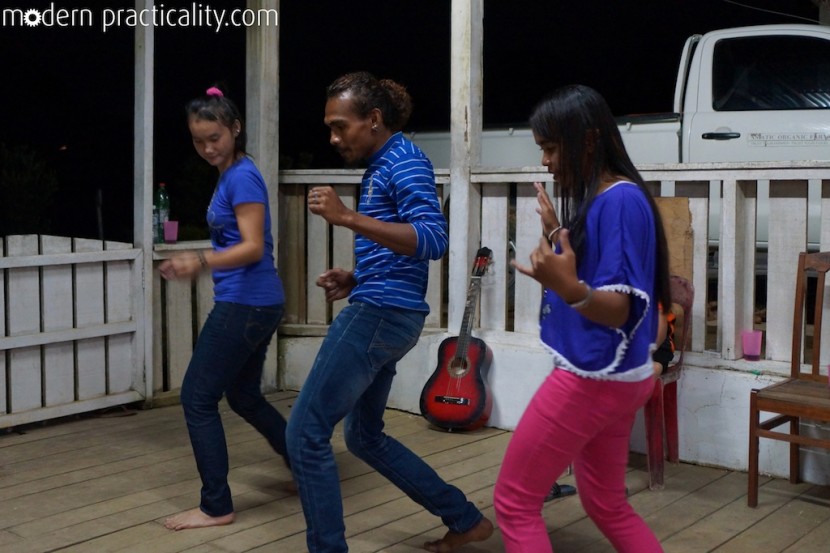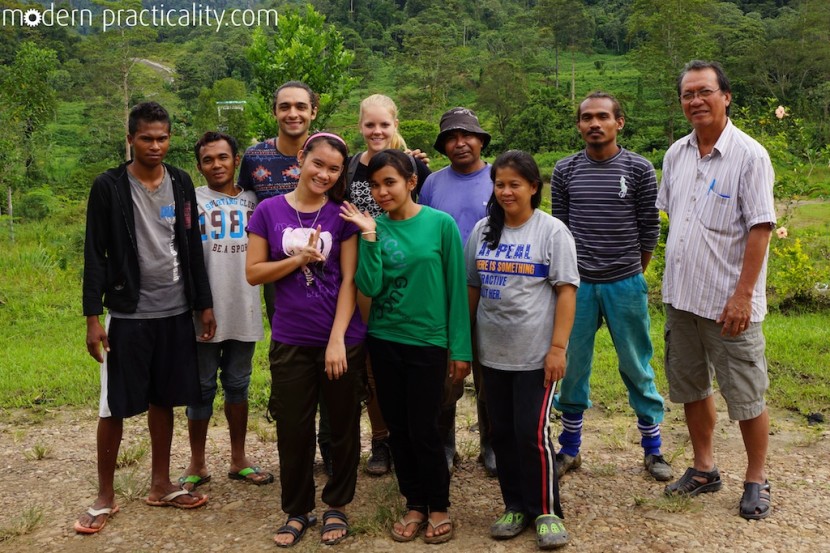
Farming In Borneo
In early January, we flew to Borneo for an opportunity to work on an organic farm in Sabah. Farm director Tony Ambrose scooped us up in Tawau, and we settled in for the 3 hour car ride west to the farm site.
Brief History
Logging operations stripped the Bornean landscape between the 70s and 90s, with illegal operations continuing into the early 2000s. This activity resulted in the decimation of a delicate ecosystem, the extinction of many rare and unique flora and fauna, and created a barren wasteland where there used to be vigorous and vital vegetation. Seizing the opportunity to extract more wealth from this clear cut land, lucrative palm-oil plantations sprang up, creating a vast monoculture where there was previously rich biodiversity.
Looking out the window of Tony’s truck we couldn’t help but feel saddened by the site of oil palms, as far as the eye could see and in every direction, where their used to be jungle, teeming with life. Though there is real poverty here aided in the short-term by the wealth and jobs generated by foreign palm oil and heli-logging operations, the environmental cost has been substantial. Byproducts of these industries include pesticides and industrial effluents, which have contributed to widespread contamination of both land and previously potable water.
Its not all doom and gloom, however, as there are a number of local organizations and foreign NGOs successfully preserving, protecting and restoring Borneo’s landscapes and wildlife. A conservation project in the Kinabatangan floodplain will see a mangrove swamp restored, a natural habitat critical to the endangered and endemic proboscis monkey. Where there is awareness and action, there is hope for the future.
The Farm
Asiatic Organic Farm is situated in the midst of several major logging and heli-logging operations. This is to be expected as AOF is owned by a logging company that was ironically issued a 100 year Sustainable Forest Management License Agreement by the Sabah State Government to manage and develop Kalabakan Forest. 10% of this land is currently being developed into an integrated wellness and ecotourism center, while the remaining 90% will be conserved for “nature based attractions”. The pro-conservation marketing slant of AOF feels a bit disingenuous as it intends to profit by exploiting the land entrusted to it to attract tourists.
That being said, if the current farm is any indication, AOF deeply respects the property. No petrochemicals are applied during any part of its farming process. Hopefully, on the road to profitability, they remain committed to their stated task of restoring a bruised and battered forest back to its former glory.
As volunteers, we worked 6 days a week for 4-5 hours a day in exchange for simple food and accommodation. Meals centered around rice or fried noodles, a heaping portion of fresh vegetables from the farm, and a little protein. At times we were offered sausage; a word of caution to the intrepid Western traveler–in Asia, sausage means hotdog.
Our room was basic but comfortable, with two single beds pushed together on the floor, a bucket and ladle for a shower and power from 5pm-10pm. Words can’t quite describe the shock and trauma of pouring a bucket of ice cold water over your head to wash away the day’s dirt and grime. Haley would regularly torture herself with a slow pour, shuddering as each bead of water rolled down her spine. My approach was to focus on getting the ordeal over with as quickly as possible, relying on rapid, successive pours. If I closed my eyes, it almost felt like taking a bath. And by almost I mean not at all. In the end life on the farm kept us busy enough that we couldn’t care less about the lack of modern amenities.
Though not certified organic due to contaminants in the soil from prior logging activities, the farm uses organic and sustainable methods of production. They make their own potting soil, EM, compost and bokashi. The beds are handmade using only a small tiller and hand tools. The farm is irrigated from natural reserves in the surrounding mountains. Scrap wood is repurposed and used to build greenhouses to protect the garden beds from frequent heavy, acidic rainfall.
This beautiful farm produces and sells tons of food to grocery stores, farmers markets and restaurants around the island. We worked with about 15 Indonesian, Timorese, Filipino and Malaysian farmers. Thomas, the farm manager, his wife and their seven children share the majority of the responsibility running the property. Everyone works hard for 8 hours a day, 7 days a week and they get paid the equivalent of $6 USD per day. It’s touching to see such a close-knit family spend each day working together toward a common goal. Seemingly without speaking, everyone knows what needs to be done and quickly and efficiently completes their responsibilities.
For Thomas and his family, who immigrated to Malaysia from the Indonesian island of Flores, the farm is more than just a job, it is their life. They eat from the garden every day. They toil in the soil together every day. His son, Anthony, and his wife had their first child there. His daughter, Elize, raises her daughter there with her husband, Agus. It is a way of life rarely seen any more in the west, certainly not without its hardships, but rich with purpose and rewarding in its own way. We are inspired by their commitment and hope to one day have a farm of our own that is half as beautiful and productive as this one!

The farm wasn’t the only beautiful thing we encountered. One of the last nights, as we were getting ready to head to bed, we heard a loud noise coming from the garden shed. Having been previously told by Tony that there were elephants migrating through the area, we bolted from our room to join our roommates outside. We hopped into a farm manager’s truck, headed down to the shed and were not disappointed. There, hurling bags of bokashi fertilizer through the air, in search of food or maybe just for fun, were two Pygmy elephants.
It was one of the most fascinating things I have ever seen. These animals were gigantic. We didn’t manage to take a picture of them because it was dark and they quickly ran away, but they did leave us a little present.
We stayed at Asiatic Organic Farm for about two weeks. It was one of the most amazing experiences we have ever had. We miss all of our new kawan (friends) on this beautiful farm.
Here are some pictures we took throughout our stay:

Matt and I hit our heads on these wooden beams more times than I can count. We were just too tall!

The Asiatic Farm Resort, still under construction.

Helping pack up all of the produce for market.

Agus, who was married to Thomas’s daughter, Elize. He was always happy and energetic, a good person to be around. Matt enjoyed playing guitar and soccer with him.

Agus and Elize’s daughter Ana and her homemade kite. She was a sweetheart. Ana was a big helper on the farm and she always had this beautiful smile on her face.

Mohammad Waheed, the sweetest boy you’ll ever meet!

These two lovely ladies cooked us breakfast, lunch and dinner every day. We enjoyed their company and learned many new Malay phrases from them.

Anthony, the compost man. He taught Matt how to operate the skid-steer loader.

The goats looked like little dogs. They were little wimps, scared of everything.

Luckily, Waheed is as clever as he is patient and was able to fix the chain using a rock to drive the pin back in place!

One Sunday we all took off and headed on a hike to a beautiful waterfall.

Lightning lit up the farm one evening.

For our last night at the farm, the family cooked us a feast. After dinner we had a dance party 🙂

Jeffrey and his sister Camillia.

Time to say goodbye to all of our friends.
Haley
Latest posts by Haley (see all)
- Visa Requirements for US Citizens Traveling Abroad - May 9, 2015
- Photos: Hoi An, Vietnam - May 9, 2015
- Photos: Halong Bay, Vietnam - May 7, 2015
- Photos: Chiang Mai, Thailand - May 7, 2015
One Response to “Farming In Borneo”





































What a great post. Thank you for sharing your fantastic experience!